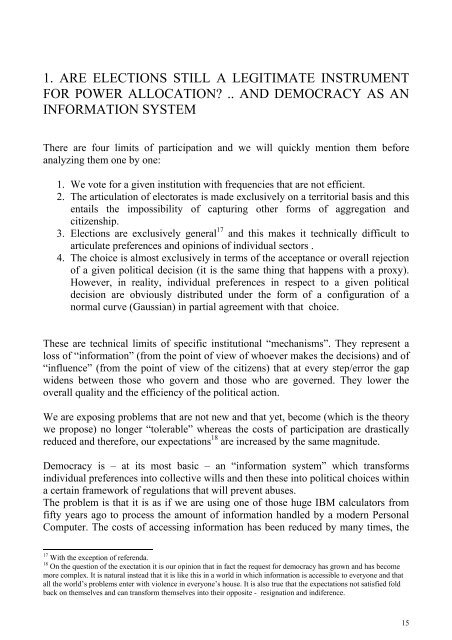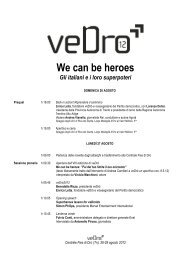democracy - Vision the Italian Think Tank
democracy - Vision the Italian Think Tank
democracy - Vision the Italian Think Tank
Create successful ePaper yourself
Turn your PDF publications into a flip-book with our unique Google optimized e-Paper software.
1. ARE ELECTIONS STILL A LEGITIMATE INSTRUMENTFOR POWER ALLOCATION? .. AND DEMOCRACY AS ANINFORMATION SYSTEMThere are four limits of participation and we will quickly mention <strong>the</strong>m beforeanalyzing <strong>the</strong>m one by one:1. We vote for a given institution with frequencies that are not efficient.2. The articulation of electorates is made exclusively on a territorial basis and thisentails <strong>the</strong> impossibility of capturing o<strong>the</strong>r forms of aggregation andcitizenship.3. Elections are exclusively general 17 and this makes it technically difficult toarticulate preferences and opinions of individual sectors .4. The choice is almost exclusively in terms of <strong>the</strong> acceptance or overall rejectionof a given political decision (it is <strong>the</strong> same thing that happens with a proxy).However, in reality, individual preferences in respect to a given politicaldecision are obviously distributed under <strong>the</strong> form of a configuration of anormal curve (Gaussian) in partial agreement with that choice.These are technical limits of specific institutional “mechanisms”. They represent aloss of “information” (from <strong>the</strong> point of view of whoever makes <strong>the</strong> decisions) and of“influence” (from <strong>the</strong> point of view of <strong>the</strong> citizens) that at every step/error <strong>the</strong> gapwidens between those who govern and those who are governed. They lower <strong>the</strong>overall quality and <strong>the</strong> efficiency of <strong>the</strong> political action.We are exposing problems that are not new and that yet, become (which is <strong>the</strong> <strong>the</strong>orywe propose) no longer “tolerable” whereas <strong>the</strong> costs of participation are drasticallyreduced and <strong>the</strong>refore, our expectations 18 are increased by <strong>the</strong> same magnitude.Democracy is – at its most basic – an “information system” which transformsindividual preferences into collective wills and <strong>the</strong>n <strong>the</strong>se into political choices withina certain framework of regulations that will prevent abuses.The problem is that it is as if we are using one of those huge IBM calculators fromfifty years ago to process <strong>the</strong> amount of information handled by a modern PersonalComputer. The costs of accessing information has been reduced by many times, <strong>the</strong>17 With <strong>the</strong> exception of referenda.18 On <strong>the</strong> question of <strong>the</strong> exectation it is our opinion that in fact <strong>the</strong> request for <strong>democracy</strong> has grown and has becomemore complex. It is natural instead that it is like this in a world in which information is accessible to everyone and thatall <strong>the</strong> world’s problems enter with violence in everyone’s house. It is also true that <strong>the</strong> expectations not satisfied foldback on <strong>the</strong>mselves and can transform <strong>the</strong>mselves into <strong>the</strong>ir opposite - resignation and indiference.15





